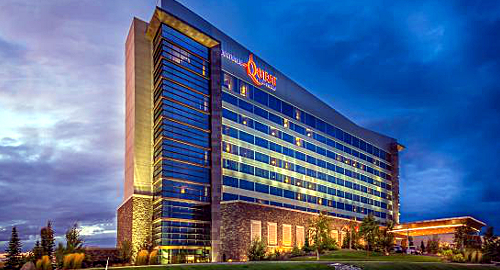 A federally recognized Washington state tribe has sued the federal government in the hope of blocking a rival tribe’s off-reservation casino plans.
A federally recognized Washington state tribe has sued the federal government in the hope of blocking a rival tribe’s off-reservation casino plans.
Last week, the Kalispel Tribe, which has operated the Northern Quest casino (pictured) in Airway Heights in Spokane County for the past 15 years, filed a lawsuit against the Department of Interior in US District Court.
The Kalispels believe the feds erred in approving the Spokane Tribe’s plan to build a $400m Hard Rock-branded casino just two miles from Northern Quest. The Kalispels say the rival gaming operation, which is still under construction, will have “a devastating impact” on Northern Quest’s revenue, on which the Kalispel’s government depends to maintain its operations.
The Kalispels’ legal argument centers around their belief that the Department’s approval of the Spokane Tribe’s casino violated the Indian Gaming Regulatory Act (IGRA), which prohibits Class III gaming (aka slots) on lands that tribes acquired after 1988.
The Spokane Tribe acquired the land – which they maintain was once part of their ancestral homeland – in 2006 but the Interior Department didn’t approve the casino project until June 2015. Last year, Washington Gov. Jay Inslee gave his approval for the Spokane casino project to proceed.
There are exceptions to IGRA’s land rules but they require the federal government to consider the potential detrimental economic impact that new casinos might have on existing tribal gaming operations. The Kalispels argue that the Department “ignored our comments and extensive expert analysis” of the impact of a rival casino on Northern Quest.
Local CBS affiliate KREM quoted Kalispel tribal director Curt Holmes saying that the Kalispels “support the Spokane Tribe’s goal to develop more economic opportunity, but not at the cost of the Kalispel Tribe of Indians and our future generations.”
Spokane Tribal Council Chair Carol Evans said her tribe had engaged in “a rigorous, comprehensive ten-year review process” to win federal and state approval of their casino plan. Evans dismissed the lawsuit’s argument that “the government is somehow required to insulate Kalispel’s gaming monopoly against fair competition from us, the resident Tribe, despite our significant unmet needs.”
Elsewhere in the state, the Cowlitz Tribe is busy prepping the April 24 opening of its new $500m Ilani Casino Resort near La Center on Washington’s southwestern border. The project, which is a joint venture with Connecticut’s Mohegan Tribal Gaming Authority, was given the green light to launch after the US Supreme Court opted not to hear objections filed by local card rooms opposed to the new competition.